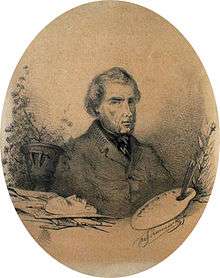Willem Pieter Hoevenaar
Willem Pieter Hoevenaar (1808, Utrecht – 1863, Utrecht), was a 19th-century painter, draughtsman, lithographer and watercolor artist from the Northern Netherlands.

Portrait of Willem Pieter Hoevenaar by his son Jozef
Biography
The painters Jan Steen and Frans van Mieris in a tavern, historical allegory painted in 1842, collection Teylers Museum
According to the RKD he learned to paint from his father, the painter Adriaenus Hoevenaar and later Pieter Christoffel Wonder.[1] His brothers Cornelis Willem and Nicolaas Ludolph were also painters.[1] His works were shown at exhibitions in The Hague and Amsterdam during the years 1828-1863, and his drawings in sepia were popular in his time.[1] His pupils were David van der Kellen Jr. and his son Jozef Hoevenaar, who drew his portrait.[1] He is known for genre works with figures, often portrayed in vintage Dutch costumes.[1]
| Wikimedia Commons has media related to Willem Pieter Hoevenaar. |
gollark: I meant that cost-effective healthcare is apparently hard for Western countries.
gollark: What about electricity?
gollark: I vaguely assumed that waste was handled by local councils here.
gollark: They could probably *not* be that, since they were much lower historically, but fixing that is... likely very hard.
gollark: Healthcare costs are something like 10% of US GDP, so it would probably require quite a lot of income tax.
This article is issued from Wikipedia. The text is licensed under Creative Commons - Attribution - Sharealike. Additional terms may apply for the media files.